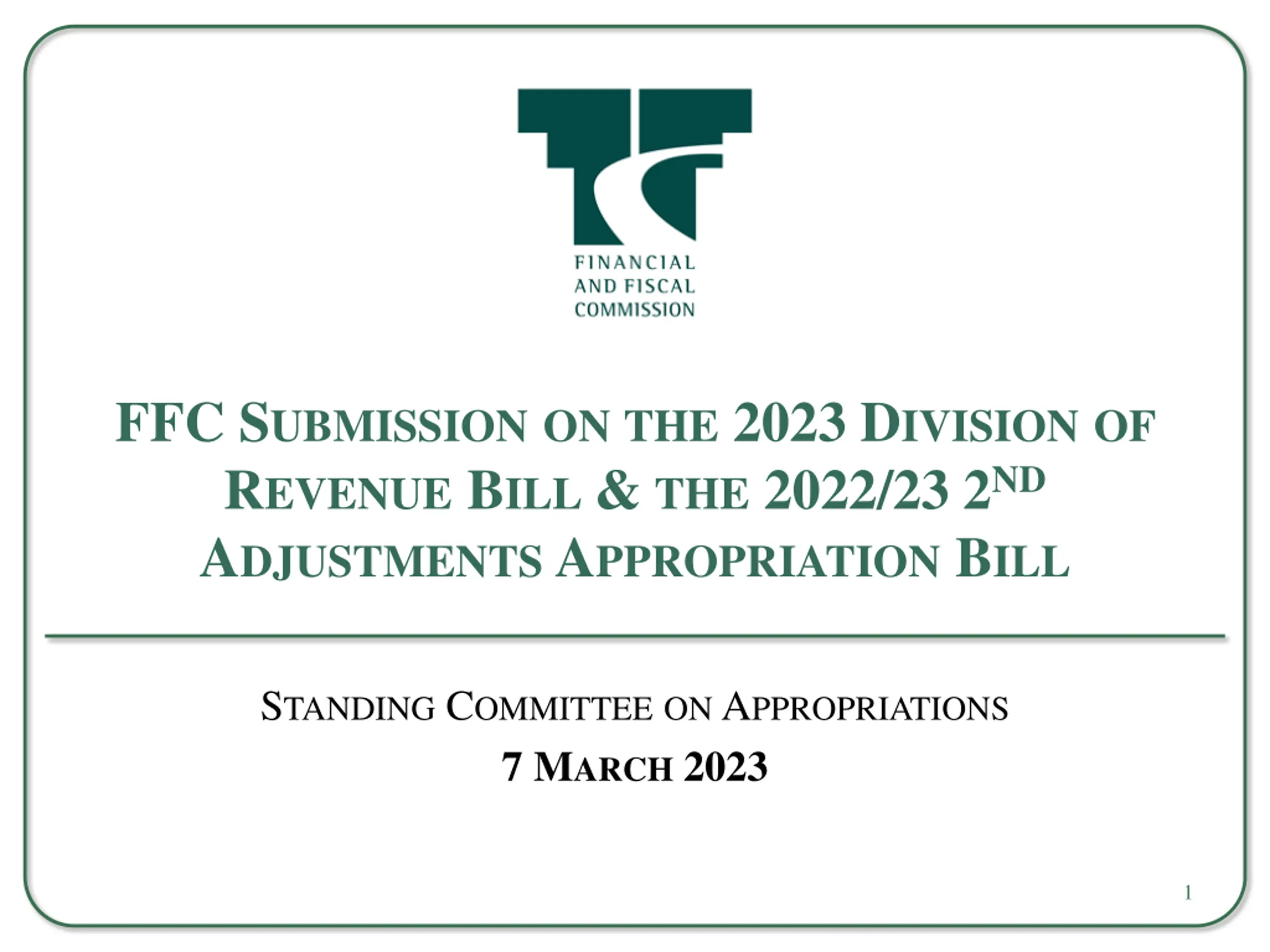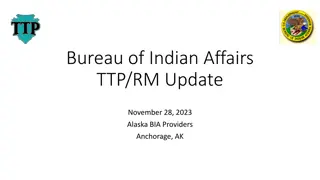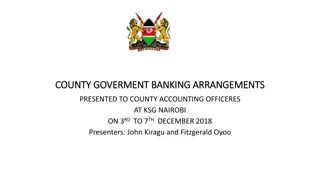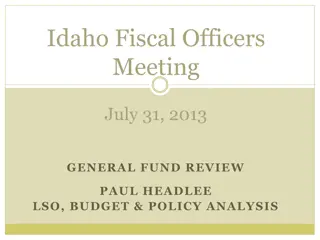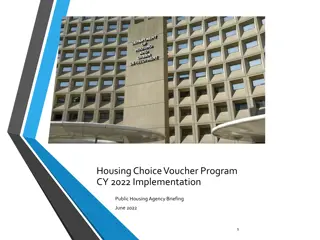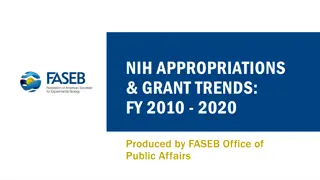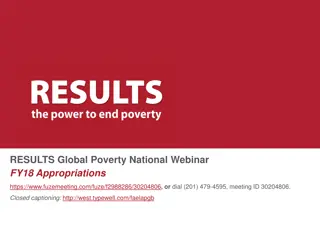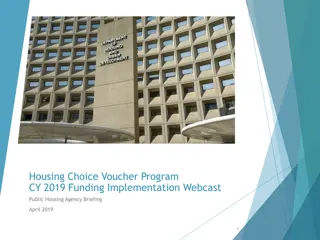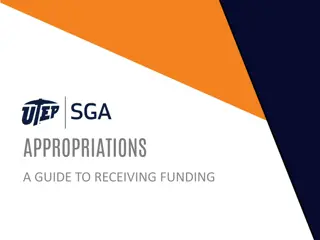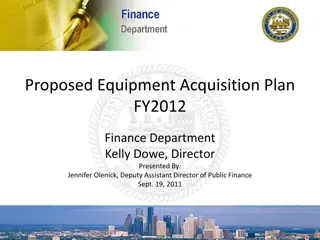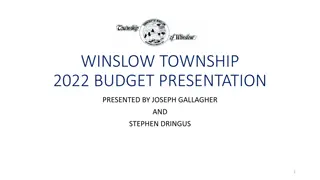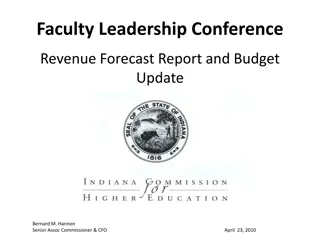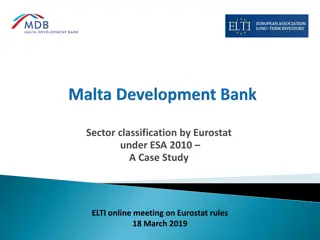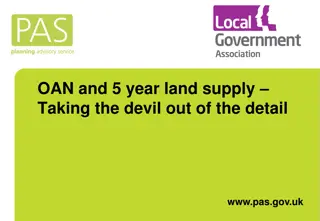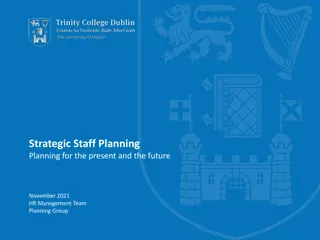Effective Financial Planning for Government Appropriations
Dive into the analysis of the 2023 Division of Revenue Bill and the 2022/23 2nd Adjustments Appropriation Bill and gain insights on strategic financial planning for government appropriations. Understand key considerations and optimize resource allocation.
Download Presentation

Please find below an Image/Link to download the presentation.
The content on the website is provided AS IS for your information and personal use only. It may not be sold, licensed, or shared on other websites without obtaining consent from the author.If you encounter any issues during the download, it is possible that the publisher has removed the file from their server.
You are allowed to download the files provided on this website for personal or commercial use, subject to the condition that they are used lawfully. All files are the property of their respective owners.
The content on the website is provided AS IS for your information and personal use only. It may not be sold, licensed, or shared on other websites without obtaining consent from the author.
E N D
Presentation Transcript
FFC SUBMISSION ON THE 2023 DIVISION OF REVENUE BILL & THE 2022/23 2ND ADJUSTMENTS APPROPRIATION BILL STANDING COMMITTEE ONAPPROPRIATIONS 7 MARCH 2023 1
FFC IN THE CONSTITUTION OF THE REPUBLIC OF SOUTH AFRICA The Financial and Fiscal Commission is a constitutional institution established under Chapter 13: Finance, Sections 220-222 of the Constitution, which makes recommendations envisaged in the following sections of the Constitution to Parliament, provincial legislatures and any other authorities determined by national legislation: s214(2) Equitable shares and allocations of revenue; s218(2) Government guarantees; s228(2)(b) Provincial taxes; s229(5) Municipal fiscal powers and functions; s230(2) Provincial loans; and s230A(2) Municipal loans All legislations referred in these sections may be enacted only after any recommendations of the Financial and Fiscal Commission have been considered 2
PRESENTATION OUTLINE 1. Budget 2023: Addressing Energy Crisis, Unemployment and Economic Growth Economic Overview and Prospects Fiscal Framework and Revenue Proposals 2023 Appropriation Bill (2022/23 2nd Adjustments Appropriation Bill) 2023 Division of Revenue Bill Provinces 2023 Division of Revenue Bill Local Government Public-sector institutions and investment Concluding remarks and Recommendations 2. 3. 4. 5. 6. 7. 8. 3
2NDADJUSTMENTSAPPROPRIATION & DIVISION OF REVENUE IN BUDGET 2023 2022/23 2ndAdjustments Appropriation N.B. Important precursor to the 2023 Main Appropriation. The Second Adjustment Appropriation Bill amounts to R9.5 billion and focuses on four aspects namely: R4.5 billion addition for carry through costs associated with the 2022/23 public service wage increase R8.4 billion for bailouts R300 million for political parties fund Reduction of R3.783 billion of unspent SRD funds within the Social Development Vote Division of Revenue in Budget 2023 Provinces and Local Government Reductions and shifting of conditional grants between direct and indirect. The amendment to Section 7 of the Division of Revenue Bill to allow provinces to pledge conditional grants as a means to strengthen state capacity and leverage private sector resources in the delivery of public infrastructure. The increase in the LGES funding is mainly due to the significant rise in electricity approved by NERSAin January, which has impacted the allocation of free basic electricity. 4
2022/23 2ND ADJUSTMENTS APPROPRIATION BILL 5
2022/23 2NDADJUSTMENTAPPROPRIATION BILL The Minister tabled a Second Adjustments Appropriation Bill for 2022/23 The Second Adjustment Appropriation Bill amounts to R9.5 billion and focuses on four aspects namely: R4.5 billion in assistance to national departments to assist with the carry through costs associated with the 2022/23 public service wage increase Unaffordable wage bill settlements remain a key risk to the fiscus commission welcomes work being spearheaded by DPSA and National Treasury to devise a single remuneration framework for the public sector R8.4 billion in bailouts for the following SOEs: R1 billion for South African Airways (SAA), R2.4 billion for the South African Post Office (SAPO) and R5 billion for the Land Bank Continued bailouts for underperforming SOEs create perverse incentives and are fiscally unsound R300 million for the political parties fund Allocation increases from R166.8 million in 2021/22 to R642.1 million in 2022/23 R3.783 billion of unspent SRD funds within the Social Development Vote 2023 Budget Review notes that the lower than anticipated spending is as a result of improved means testing First Adjustment Bill tabled in October 2022, R1.8 billion was unspent due to a lower than anticipated take-up of the SRD grant due to more stringent grant eligibility criteria being applied Progressive erosion in the number of people that are accessing this grant as a result of the tightening of the eligibility criteria this alongside persistent unemployment and worsening socioeconomic conditions that prevail and which disproportionately affects poor households 6
RECOMMENDATIONS With respect to the Second Adjustments Appropriation Bill for 2022/23, the commission recommends that: Commission s stance remains unchanged, in that it fundamentally views bailouts as fiscally unsound. As recommended in its Submission on the 2022 Special Appropriation Bill, government must devise systems of accountability and measures of control to mitigate SOEs from indulging in moral hazard behaviour. Pre-conditions and conditions required for bailouts, including financial and operational reporting have been implemented, however, outcomes have been limited In the spirit of greater transparency and accountability, future bills must be accompanied by more information/explanation of the rationale for proposed adjustments example of allocation to the Represented Political Parties Fund With the first Adjustment Bill, R1.8 billion was unspent due to a lower than anticipated take-up of the SRD grant caused by more stringent grant eligibility criteria being applied. The Second Adjustment Appropriation Bill reduces the SRD grant by a further R3.7 billion as a result of improved targeting. In light of the persistent unemployment and worsening socioeconomic conditions that prevail and which disproportionately affects poor households, the commission is concerned about the progressive erosion in the number of people that are accessing this grant as a result of the tightening of the eligibility criteria 7
2023 DIVISION OF REVENUE BILL PROVINCES 8
OVERVIEW OF PROVINCIAL GOVERNMENT ALLOCATIONS Over the 2023 MTEF, the budget proposes a total provincial allocation of R2.2 trillion increasing from R2 trillion in 2022 MTEF, this represents a nominal growth of 9.5 per cent The total allocation for provinces in 2022 budget for 2022/23 was R658.4 billion and was revised upwards to R684.5 billion in 2022 MTBPS and was driven mainly by adjustments made both in the equitable share and conditional grants mainly because of disasters and human resources and training For 2023/24, the 2022 MTBPS projected a total allocation of R684.4 billion for provinces - R556.4 billion equitable share and R128.0 billion for conditional grants In the 2023 budget, the total allocation for provinces has been revised upwards to R694.0 billion - an additional allocation of R9.6 billion Adjustment is mainly on the provincial equitable share to accommodate the 2022/23 public servants wage increase costs. A total of R31.1 billion has been added for employee compensation over the 2023 MTEF While adjustments on the provincial fiscal framework were implemented in both the 2022 and 2023 MTEF, adjustments remain marginal and in the main are for the compensation of employees and restoration and infrastructure repairs as a result of flooding 9
TOTAL PROVINCIAL GOVERNMENT MTEF ALLOCATIONS 2500 2000 1500 R billion 1000 500 0 2021 Budget 2021 MTBPS 2022 Budget Budget & MTBPS 2022 MTBPS 2023 Budget PES CG Total 10
KEY PROVINCIAL CONDITIONAL GRANTS The total provincial conditional grants allocation for the 2023/24 financial year amounts to R127.5 billion, increasing from R123.7 billion in the 2022/23 financial year Anominal increase R3.8 billion - representing a nominal increase of a 3.1 per cent While HSDG allocation increased from R13.4 billion in 2021/22 to R14.3 billion in 2022/23 and will increase to R14.9 billion in 2023/24 - allocations remain far lower than R19.6 billion for 2020/21 - this implies a continued delay in reducing housing backlogs and improving housing and living conditions for the poor households In 2023 budget, the commission also notes with concerns the shifting of provincial emergency housing grant from provinces to the national department of human settlements from 2023/24 financial year as it is of the view that provinces are better placed to understand and implement than the national government which is expected to play a monitoring role District health programme which is for HIV/AIDS, TB, Malaria and Community Outreach has shown a decline in 2023/24 to R26.8 billion from R29.0 billion in 2022/23 - a decrease of 7.6 per cent, the commission is concern with this reduction of funding given the expanded and important role of the grant as it supports HIV/AIDS prevention programmes and specific interventions which include counselling and testing, prevention of mother-to-child transmission,ARV treatment and homebased care 11
RECOMMENDATIONS The commission notes with concern a 7.6 per cent decrease in the district health program in 2023 and recommends that the Department of Health should indicate how these reduced resources are likely to affect service delivery and how this tighter budget would be managed especially given the expanded scope of the district health program While the commission supports funding for emergency housing needs as a result of flooding, it reiterates its previous recommendation that the provinces and municipalities should develop and implement adaptation and mitigation strategies to address natural disasters in the long term The commission notes with concern the shifting of provincial and municipal emergency housing grants to the national department of human settlements, the commission recommends that shifting conditional grants from provincial and local government spheres to the national sphere should be the last resort as lower spheres of governments are better positioned to understand delivery needs 12
2023 DIVISION OF REVENUE BILL LOCAL GOVERNMENT 13
INTRODUCTION Local government is faced with numerous challenges. One of these challenges is the political environment in that municipalities find themselves. 2023 will be another challenging year for municipalities as the political landscape is fraught with governance and fiscal challenges which have the potential to adversely impact the delivery of basic services To assist municipalities with their developmental role and improve service delivery, municipalities need to strengthen municipal finance and investments with support from both national and provincial governments. This will aid in cohesive planning between the three spheres of government to achieve the country's growth goals. Many calls for interventions have been made to develop strategies to help strengthen the local sphere. It s an ongoing initiative between the government and various stakeholders to develop key policy recommendations to aid municipalities in fulling their constitutional mandate. Given the insufficient capacity and the other insurmountable challenges engulfing local government, the commission notes the ongoing work being completed in reviewing the conditional grant system and supports the government's endeavours in supporting municipalities. 14
LOCAL GOVERNMENT EQUITABLE SHARE The share of local government allocations is expected to increase over the MTEF, from 9.7 per cent in 2023/24 to double-digit of 10.1per cent in the two outer years of the medium term Local Government Equitable Share Allocations 250 R billion 9 200 8 9 8 57 8 4 150 54 6 52 52 Commission notes and welcomes the additional allocation to local government as it will assist with alleviating some of the pressures municipalities faces. 17 40 45 16 15 44 100 15 14 15 13 109 104 50 97 87 83 76 66 The commission would like to reiterate the national and provincial spheres' role in supporting the municipalities in fulfilling their constitutional mandate. 2019/20 2020/21 2021/22 2022/23 2023/24 2024/25 2025/26 Equitable share and related General fuel levy Conditional grants Indirect transfers 15
LOCAL GOVERNMENT TRANSFERS Average Real Growth Rates Total local government transfers will increase over by 4 per cent over the MTEF 6.00% 5% 5.00% The increase in LES allocation, in turn, has resulted in positive (3 per cent) real average 3.67% 4.00% 3% 3.00% 2.00% The government s efforts to keep LES growth rates above inflation through increased allocation - the positive real growth rate of the LES will go a long way in offsetting the ever-increasing costs of basic services. commission welcomes the 1% 0.87% 1.00% 0.00% -0.49% -1.00% -1% -2.00% -1.73% -3.00% However, the marginal increase puts added pressure on municipalities' ability to deliver services given the economic backdrop. Local Equitable share General fuel levy Conditional grants Government sharing with metropolitan municipalities Average growth from 2020/21 to 2022/23 Average growth rates Over MTEF 16
LOCAL GOVERNMENT CONDITIONAL GRANT Real Growth Rates in Three Local Government Transfer Window 20% 16% 15% 10% 9% 5% 6% 6% 5% 5% 4% 4% 4% 6% 0% 0% 0% 0% 0% 0% -2% 2020/21 2021/22 2022/23 2023/24 2024/25 2025/26 -5% -10% -15% -15% -19% -20% -25% Infrastructure Capacity building and other RSC levy replacement The figure shows a steady decline in real growth rates of the infrastructure grant in 2023/24, with zero growth in the outer years of the MTEF. The commission notes the current conditional grant review and recommends that as part of this review the proliferation of infrastructure grants be reviewed and addressed taking into consideration the previous recommendation made by the FFC. 17
CONDITIONAL GRANT CHANGES Additions to the baseline on direct conditional grants are noted over the 2023 MTEF of R6.19 billion. The commission welcomes additions to the baseline on direct conditional grants are noted; on Urban Settlement Grant (R2.2 billion), Public Transport Network Grant (R461 million), and Regional Bulk Infrastructure Grant (R3.85 billion) over the 2023 MTEF as they are key to service delivery and boosting economic growth. However, during the 2023 MTEF, municipal conditional grant baselines are expected to be reduced by over R735 million; R574 million from direct conditional grants These reductions to the baseline grants due to the discontinuation of the Municipal Emergency Housing Grant with the funding to be shifted to the National Department of Human Settlement. The commission notes the steady decline in real growth rates of the municipal conditional grants in 2023/24, with no growth in the outer years of the MTREF and advises that this will negatively impact on the outcomes of the economic recovery plan which is based on infrastructure-led growth programmes. The commission also notes the changes made to Municipal infrastructure Grant and the establishment of an indirect component and the basis of identifying municipalities needing support. 18
RECOMMENDATIONS The commission notes the proposed increase in the total allocation to the local government's equitable share over the medium term. However, the FFC would like to reemphasise the previous recommendation of fundamentally reviewing the local government transfers, especially from the perspective of the vertical division of revenue. This review should also include a proper re-examination of the assumptions used in the local government White Paper. The FFC recommends that the review of capacity-building and infrastructure grants consider that capacity-building efforts are comprehensively consulted with and agreed to with a municipality; it should link capacity-building actions to a municipality-specific diagnosis of capacity challenges or deficits. It should consider the consolidation of local government conditional grants into an integrated financial flow. The FFC would like to stress the need to determine the roles and functions of the role players in the District Development Model and the funding requirements/responsibilities to eliminate any ambiguity. 19
PUBLIC-SECTOR INSTITUTIONS AND INVESTMENT 20
GUARANTEES TO STATE-OWNED COMPANIES Government guarantees and exposure to SOEs, 2020/21-2022/23 R billion 2020/21 2021/22 2022/23 Guarantee 581.6 350.0 37.9 43.0 19.1 Exposure 384.7 298.3 37.4 13.2 6.7 Guarantee 559.9 350.0 37.9 25.0 19.1 Exposure 395.3 313.0 42.0 9.6 2.8 Guarantee 478.5 350.0 37.9 25.0 19.1 Exposure 396.1 337.8 28.6 8.7 0.3 Public institutions Eskom SANRAL Trans-Caledon Tunnel Authority South African Airways Land and Agricultural Bank of South Africa Development Bank of Southern Africa Transnet Denel South African Express Industrial Development Corporation South African Reserve Bank 9.6 2.4 9.6 1.9 8.1 0.4 10.0 4.9 9.9 5.2 9.9 5.5 3.5 6.9 0.2 3.8 3.4 0.0 3.5 3.4 0.0 3.8 3.5 0.0 3.5 3.4 0.0 3.8 0.3 0.0 0.5 0.1 0.5 0.1 0.5 0.1 100.0 13.7 100.0 12.8 20.0 10.0 Whereas government guarantees to public institutions are forecasted to decelerate by R81.4 billion to R478.5 billion by 31 March 2023, the government's guarantee exposure will accelerate by approximately R800 million and reach R396.1 billion. Government exposure to SOEs remains very high, particularly to Eskom. The government's guarantees exposure to Eskom, increased from R298 billion in 2020/21 to R337 billion in 2022/23. The total government guarantee exposure is forecasted to increase from R385 billion in 2020/21 to R396 billion in 2022/23. 21
FINANCIAL PERFORMANCE OF STATE-OWNED COMPANIES SOEs continue to face considerable hurdles in fulfilling their developmental mandates. The challenges they encounter entail, among other things, a lack of clarity in objectives, a multiplicity of mandates within their business models, improper costing of mandates, complex and decentralised oversight model, governance interference manifested in political appointments of boards and senior management, non-adherence to international best practices in corporate governance dictates, severe breaches of procurement policies, and weaknesses in oversight by line ministries and SOEs boards. The SOEs reflect weak financial performance. Most of the major SOEs experienced sharp declines in the value of their assets, which constitutes a fiscal risk for the government as they require fiscal transfers to cover their losses and recapitalise their balance sheets. 22
SOUTH AFRICAAIRWAYS (SAA) The partial sale of SAA is yet to be finalised, subject to the approval of R3.5 billion to settle historical liabilities by the National Treasury. It has not submitted financial statements for the most recent year. 2020 The 2020 budget allocated R16.4 billion to SAA over the 2020 medium term expenditure framework period for state-guaranteed debt and interest costs. To implement the business rescue plan, an additional R10.5 billion was allocated to SAA in the 2020 MTBPS. 2021 SAA exited business rescue in April 2021 and restarted domestic and regional operations. 2022 The government has significantly reduced its contingent liability exposure to SAA, and the airline is expected to no longer require government guarantees by the end of 2022/23. An additional R1 billion will be allocated during 2022/23 to assist SAA with any outstanding obligations from the agreement reached between the rescue practitioners and the airline's creditors. 23
PUBLIC INFRASTRUCTURE INVESTMENT Public infrastructure investment, 2019/20-2025/26 140 120 100 R billion 80 60 40 20 0 National Provincial Local Public entities Public-private partnerships State-owned companies 2019/20 2020/21 2021/22 2022/23 2023/24 2024/25 2025/26 Public infrastructure investment is expected to increase over the MTEF period. The commission supports the increased funding on infrastructure investment as it will promote longer-term growth prospects. However, as noted in previous submissions by the commission, the government should remain committed to improving the management of infrastructure spending, given that mismanagement, wasteful expenditure, cost overruns, delayed project completion, and defective workmanship often characterise public infrastructure projects. 24
PUBLIC INFRASTRUCTURE INVESTMENT [CONT.] Regarding the shares of public infrastructure investment, state-owned companies make up the largest share at 27.9 per cent in 2022/23. The shares of public entities and state-owned companies are increasing, while the provincial and local government shares are decreasing. The increasing shares of public infrastructure investment in public entities and state-owned companies indicates that the government is increasingly implementing public infrastructure investment through public entities and state-owned companies. As noted in previous submissions made by the commission, this increasing trend is concerning, given the poor performance of public entities and state-owned companies. The decreasing share of local government is also concerning given the huge infrastructure backlogs in municipalities (both new infrastructure and rehabilitation and maintenance of existing infrastructure) Public infrastructure investment shares, 2019/20-2025/26 40% 35% 30% Percentage 25% 20% 15% 10% 5% 0% National Provincial Local Public entities Public-private partnerships State-owned companies 2019/20 2020/21 2021/22 2022/23 2023/24 2024/25 2025/26 25
RECOMMENDATIONS The commission recommends improving corporate and fiscal governance through reforms that enable SOEs' management boards the operational autonomy they require to make profit- maximising decisions and eliminating political interference to enhance operational transparency. The commission recommends the establishment of explicit and progressive guidance to SOEs on expected rates of return and the distribution or reinvestment of profits. The commission reiterates its recommendation that decisive judgement is made to deliver on return-to-investment effectively and efficiently. Failing which, dysfunctional SOEs should be restructured, sold off or shut down. 26
8. CONCLUDING REMARKS AND RECOMMENDATIONS With respect to the 2022 Second Adjustments Appropriation Bill Specifically, on the bailouts to the three SOEs, the commission's stance remains unchanged in that it fundamentally views bailouts as fiscally unsound and, as recommended in its submission on the 2022 Special Appropriation Bill, the government must devise systems of accountability and measures of control to mitigate SOEs from indulging in moral hazard behaviour. It is worth noting that the pre-conditions and conditions required for bailouts, including financial and operational reporting by the SOEs, have been implemented with limited outcomes. 27
8. CONCLUDING REMARKS AND RECOMMENDATIONS (CONT.) With respect to the 2023 Division of Revenue Bill Provinces The commission notes with concern the 7.6 per cent decrease in the district health program and recommends that the Department of Health elaborate on how it would likely affect service delivery and management, given the expanded scope of the district health program. While the commission supports funding for emergency housing needs due to flooding, it reiterates its previous recommendation that the provinces and municipalities should develop and implement adaptation and mitigation strategies to address natural disasters in the long term. The commission notes with concern the shifting of provincial and municipal emergency housing grants to the national department of human settlements. The commission recommends that shifting conditional grants from provincial and local government spheres to the national sphere should be the last resort as lower spheres of governments are better positioned to understand delivery needs. 28
8. CONCLUDING REMARKS AND RECOMMENDATIONS (CONT.) With respect to the 2023 Division of Revenue Bill Local Government: The FFC recommends that the review of capacity-building and infrastructure grants consider that capacity- building efforts are comprehensively consulted with and agreed to with a municipality; it should link capacity-building actions to a municipality-specific diagnosis of capacity challenges or deficits. It should consider the consolidation of local government conditional grants into an integrated financial flow. The commission notes the proposed increase in the total allocation to the local government's equitable share over the medium term. However, the FFC would like to reemphasise the previous recommendation of fundamentally reviewing the local government transfers, especially from the perspective of the vertical division of revenue. This review should also include a proper re-examination of the assumptions used in the local government White Paper. The FFC would like to stress the need to determine the roles and functions of the role players in the District Development Model and the funding requirements/responsibilities to eliminate any ambiguity. 29
